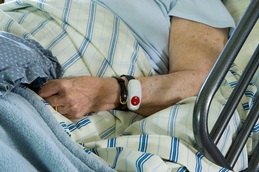CQC records increase in use of restraint and calls for care homes and hospitals to be more transparent
England’s care home regulator, the Care Quality Commission (CQC), has called for care homes and hospitals to reduce their use of restraint when caring for adults with challenging behaviours.

The CQC has issued its fourth annual report into the Deprivation of Liberty Safeguards (DoLS) revealing that for people aged 75 to 84, there was an 81 per cent jump in the number of restraint applications and among those aged over 85, a 69 per cent increase.
Most applications and authorisations relate to older people with dementia living in care homes. Dementia accounted for 53 per cent of all applications in 2012/13, of which 59 per cent were authorised.
Research into whether care home providers are fulfilling the requirements of the Deprivation of Liberty Safeguards (DoLS) – introduced in 2009 as part of the Mental Capacity Act (2005) – has led to the regulator concluding there are too many examples of restraint being used where it might be avoided.
Of specific concern is the tendency to favour DoLS over efforts to reach a more in-depth understanding of a resident’s condition, which itself includes a failure to listen to the opinions of loved ones. The CQC report also finds that attempts to challenge DoLS are largely ineffective once procedures are in place, calling upon local authorities to empower those who wish to challenge such authorisations.
CQC chief executive, David Behan, said: “We expect more focus on reducing the restraint and restriction of vulnerable people lacking capacity.
“We want to ensure people who are unable to consent to treatment because they lack capacity receive high quality care as a fundamental part of health and care services. While there has been an increase in the use of DoLS there is still much more that needs to be done to ensure people are appropriately cared for.
“This year, CQC is strengthening its approach to monitoring this legislation and we will be working more closely with local authorities to support them in their roles as supervisory bodies.”

The CQC is also demanding more transparency from care homes on this issue, finding that two-thirds of care homes applying for DoLS fail to notify the regulator of their applications or their outcomes.
Care homes, hospitals and local authorities are asked to strengthen their approach so that issues surrounding restraint are better understood, with the CQC eager to stamp out regional variations and reduce notification failures.
Alzheimer’s Society’s head of policy and public affairs, George McNamara, comments: “These findings point to a worrying lack of awareness and understanding of the use of Deprivation of Liberty Safeguards. It is unacceptable that the majority of care providers are not following correct procedure when using this measure.
“Over half the applications were for someone with dementia and much more needs to be done across health and social care to ensure DoLS are better understood and implemented consistently, ensuring the best possible quality of care and support. It is essential that the CQC continue to monitor its use to protect those most vulnerable in society.”
Overall applications for use of restraint have risen by 85 per cent since 2009/10, with 6,546 applications granted in 2012/13 out of a total 11,887 that were processed.
Latest News Analysis
 04-Sep-19
Extra £1.5 billion announced for social care in Chancellor's Spending Review
04-Sep-19
Extra £1.5 billion announced for social care in Chancellor's Spending Review
 02-Jul-19
Department of Health forced to rethink care homes' nursing rates after legal challenge
02-Jul-19
Department of Health forced to rethink care homes' nursing rates after legal challenge
 18-Jun-19
Overnight care workers forced to sleep in offices and told 'bring your own bedding'
18-Jun-19
Overnight care workers forced to sleep in offices and told 'bring your own bedding'
 14-Jun-19
Back in the closet: Third of care home staff have had no LGBT+ awareness training
14-Jun-19
Back in the closet: Third of care home staff have had no LGBT+ awareness training
 11-Jun-19
PM candidates on social care: Rory Stewart calls fixing care an 'unfinished revolution'
11-Jun-19
PM candidates on social care: Rory Stewart calls fixing care an 'unfinished revolution'